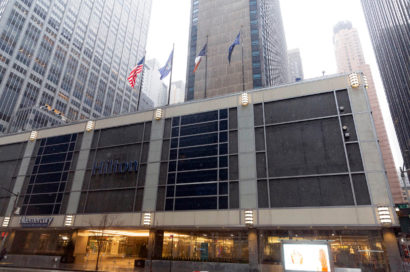Top hotels should all be hosting health care workers now
by Heather Robinson

From The New York Post

The Four Seasons Hotel in New York recently opened its doors to first responders battling the novel coronavirus. A handful of other hotels, including the Plaza and the St. Regis, have followed suit, and this week the Hilton and Marriott chains pledged millions in hotel rooms for first responders across the country.
But why aren’t more Gotham hoteliers, including President Trump, offering underused rooms to overworked medical personnel?
Because they work directly with the infected, first responders such as EMTs, doctors, nurses and other medical personnel are at higher than average risk to contract the illness. They are also more likely than the general population to be asymptomatic carriers. They need help.
Photographs online show some of these heroes sleeping on hospital floors. If they are fortunate enough to steal a few hours’ rest at home, many use public transportation to get there: another exposure risk. This seems unnecessary when, according to a report issued Tuesday by Public Advocate Jumaane Williams, some 100,000 hotel rooms sit vacant.
Williams and other city officials and advocates are calling for 30,000 hotel rooms to be freed up for the homeless population to self-quarantine and/or be prophylactically housed as the epidemic rages. But if such provision is to be made for the homeless, why not also for those selfless first responders on the front lines?
Unused space in some of the city’s hotels could provide a comfortable and convenient haven for medical personnel who don’t feel safe self-quarantining at home. By staying close to medical centers, sometimes just a few minutes’ walk away, they would better protect their families and the public.
Dr. Eugene Shostak, a pulmonologist and critical-care specialist treating coronavirus patients in the city says his colleagues who “don’t have a place to properly quarantine” and “live with the fear of bringing something home” would “jump at the chance” to quarantine, including preventively, in a New York hotel.
Shostak adds that while he sent his family to live with in-laws and can avoid the subway, he has heard discussion of the “elaborate rituals” health providers are going through to minimize their odds of infecting others.
As a New Yorker holed up in a Pittsburgh hotel — because a two-week self-quarantine is mandated upon leaving the city even for those who feel fine — I’m staying in one of only 20 rooms that are occupied, out of 132. If Big Apple hotels are as near-vacant as this one, and authorities believe they are, individual first responders could have entire floors to themselves.
While potentially deadly in the short-run, the virus becomes inert after several days, and hotels can be disinfected after these hero guests check out.
Cities on our West Coast seem to be outpacing New York in providing this type of accommodation to first responders, and they also appear to be eclipsing Gotham in containing the virus’ spread.
Seattle, for instance, which seems to be flattening the curve more quickly than New York, booked an entire hotel for three months to house first responders. Also this month, Houston leased two hotels to provide first responders and the homeless space to quarantine, also providing food; a third hotel is being leased for police officers and firefighters.
Baltimore, Chicago, San Francisco and smaller cities have similarly stepped up. The University of Pittsburgh has offered one of its dormitories with a sky bridge to the school’s hospital as no-cost housing for health workers treating the infected.
Last week, the American Hotel and Lodging Association launched its “Hospitality for Hope Initiative,” furnishing the US Department of Health and Human Services a database of hotels and motels agreeing to house first responders and even coronavirus patients. Hundreds were expected to volunteer, but with 15,000 properties signed up, the hospitality industry has surpassed expectations.
As deaths peak, perhaps the president could open Trump International Hotel and Tower, currently still booking rooms to travelers, to New York’s brave first responders.
In Tuesday’s coronavirus briefing, the president encouraged Americans to use the hashtag #AmericaWorksTogether as we continue to make sacrifices for the common good, saying every American should be inspired by first responders’ selflessness. Amen. A respectful suggestion: He and more New York hoteliers should follow the responders’ heroic lead.



